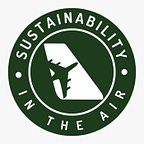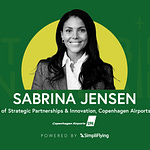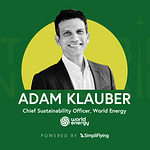In this episode of our ‘Sustainability in the Air’ podcast, Sangita Sharma, Director of Delta Air Lines’ Sustainable Skies Lab, speaks with SimpliFlying CEO Shashank Nigam, and shares how the lab is fostering innovation and accelerating a sustainable future for air travel.
Here are the key highlights of the conversation:
The vision behind Sustainable Skies Lab (4:09)
How the lab tracks metrics and promotes sustainability (7:17)
Striking a balance between new technology and optimising the old (11:05)
Exploring sustainable taxiing (19:10)
Collaboration with MIT to study contrail formation (23:38)
Encouraging employee engagement (25:59)
Rapid Fire! (32:37)
Keep reading for a quick overview of the episode.
Why the Sustainable Skies Lab matters
The Sustainable Skies Lab was launched in 2023 by Delta Air Lines to advance research, design and testing for transformative sustainable technologies.
While not a physical space, the lab serves as an ideational framework that treats the entire operations of Delta as a laboratory for testing and implementing sustainable innovations. This allows for real-time testing of sustainability initiatives.
Sharma illustrates the Sustainable Skies Lab’s pivotal role in advancing Delta’s sustainability agenda, describing it as a catalyst for both near-term and long-term environmental goals.
The lab also seeks to merge Delta’s extensive operational knowledge with cutting-edge innovations across the aviation industry, creating a collaborative environment for testing and scaling new technologies.
An example of the lab’s efforts is ongoing testing of sustainable taxiing technologies, such as super tugs, that can potentially offer significant fuel savings, by allowing aircraft to taxi without using the main engines.
“We [at Delta] have big lofty [sustainability] goals. We want to make sure that we are approaching those goals with near-term and long-term solutions. And with those long-term solutions, I think having a disciplined innovation framework helps to make sure that we prioritise applied innovation… the lab is a framework to understand the impact [of such solutions] this year, two years from now, five years from now… And how do we scale solutions thoughtfully to get [meaningful] impact.”
4 ways Delta’s Sustainable Skies Lab is promoting sustainability
1. Balancing optimisation of current fleet with introduction of new technologies
Known for “sweating its assets,” Delta extends the operational life of its aircraft, including second-hand planes, to ensure maximum utilisation and sustainability.
The Sustainable Skies Lab works closely with Delta’s fleet strategy team, to balance fuel efficiency, operational economics, and environmental impact, ensuring a holistic approach to optimise CO2 efficiency across the fleet.
Delta has also set an ambitious interim goal to forge partnerships with five innovators in revolutionary fleet technologies by 2025. The airline is actively engaging with Joby Aviation for urban air mobility solutions and with aerospace giants Boeing and Airbus on future-oriented projects. This includes participating in Boeing’s development of a truss-braced wing aircraft, which promises enhanced fuel efficiency through an extended wing design, and partnering with Airbus on the ZEROe program, which explores hydrogen technology and blended wing concepts.
2. Contrail mitigation research with MIT
Condensation trails or “contrails” are long, thin clouds that form behind an airplane in cold and humid conditions. Since contrails are made up of small ice crystals, they trap heat in the Earth’s atmosphere and contribute to global warming. Recognising the complexity of contrail formation, Delta has partnered with MIT to explore scientific approaches to mitigate their warming effects.
The collaborative research focuses on improving detection and forecasting of contrail formation, and the impact of flight path deviations to avoid contrails. Such deviations, while potentially reducing warming contrails, could lead to increased fuel consumption. The project also aims to minimise unintended consequences from trying to mitigate the environmental impact of contrails.
3. Sustainable Taxiing Initiatives
The current standard operating procedure in aviation for taxiing involves using a single engine to save fuel, a practice that has evolved from previously using both engines for taxiing.
To further enhance fuel efficiency and reduce emissions, the Sustainable Skies Lab is exploring the use of either a super tug or another technology attached directly to the aircraft’s landing gear, to allow planes to taxi without using the main engines, potentially offering significant fuel savings.
These solutions could utilise an Auxiliary Power Unit (APU) that may be hybrid or electric in the future, or rely on the power of a tug vehicle. A significant aspect of this innovation is maintaining pilot control over the aircraft during taxiing, differentiating it from conventional tug operations where ground staff control the vehicle. Collaborations with vendors and regulatory approval from the FAA are underway to ensure these technologies are safe for operational use.
4. Encouraging employee engagement
Delta Air Lines is actively engaging all its operational divisions in testing and trialling sustainable solutions, from pilots working with taxi bots to TechOps focusing on engines and sustainable aviation fuel (SAF) and a carbon council addressing ground equipment issues.
Last year, Delta organised a company-wide competition wherein employees were encouraged to submit sustainable ideas. The competition resulted in a wide range of proposals, from office recycling programs to customer engagement strategies for lighter travel. It also highlighted the creativity and commitment of Delta’s workforce towards sustainability, adds Sharma. She also underscores the need to listen to employees and act on innovative ideas to drive meaningful change within the company.
‘Sustainability in the Air’ is the world’s leading podcast dedicated to sustainable aviation. Through in-depth conversations with top aviation leaders, we break through the clutter and provide a clear roadmap for a net-zero future.












